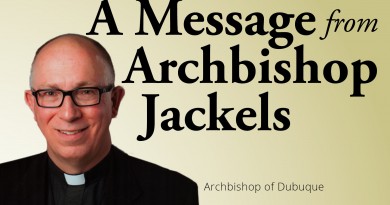The word was made flesh, now give flesh to the word
The word was made flesh – this is how John’s gospel refers to the birth of the Son of God as a son of man at the first Christmas.
The words are familiar to us, sweet to us, bringing joy and peace when we think of the word made flesh, Jesus, and his teachings, saving deeds, and the way of life he left us.
But the words of the gospel also challenge us. Someone once said that Christ could be born a thousand times in Bethlehem, but all in vain until he is born in me.
It isn’t enough to hear the word, the teaching of Jesus; we need to give his word flesh in our lives. But what word, or teaching of Jesus must we embody?
Jesus’ preaching can be summed up in his word or teaching about love: love God and love your neighbor, as you love yourself, and as I have loved you, Jesus said.
In the parable of the good Samaritan Jesus teaches further that our neighbor is anyone in need: family or friend, acquaintance or stranger, even an enemy (Luke 10:25).
He or she has a claim on our pardon and service, our kindness and gentleness, no matter who it is, if deserving, asks nicely, appreciates the cost, or is grateful.
This is the greatest commandment, Jesus teaches, the fulfillment of the law and the prophets, and the sign that a person is living under the reign of God (Mark12:28-34).
Love your neighbor is the word that the Church’s preaching plants in our heart, and that we are not only to hear, but also put into practice (James1:21-22).
Love your neighbor is the practice of a pure and genuine religion (James1:27), which can preserve us in holiness until the day when Jesus will come again at the end of time (1 Thessalonians3:13).
On that day, Jesus will judge us on whether or not we loved our neighbor, and those who practiced love will enjoy heaven, but those who did not, will not (Matthew25).
Love your neighbor – this is the word that will wipe our sins away, the word that heals our souls, and the religious practice that covers a multitude of sins (1 Peter4:8).
This is a balm that heals us and, as a consequence, that heals the Church of the wounds and sickness that we, its members, have caused by our sinful selfishness.
And love of neighbor – not attention to rules, rituals, and the rod of punishment – is what will keep our Church membership faithful, and will attract new growth.
The word was made flesh. These words bring us joy and peace, and challenge us: now we must give flesh to the word, by loving God and neighbor, so that the birth of Jesus in Bethlehem will not be in vain.
Merry Christmas, and a Happy New Year!


